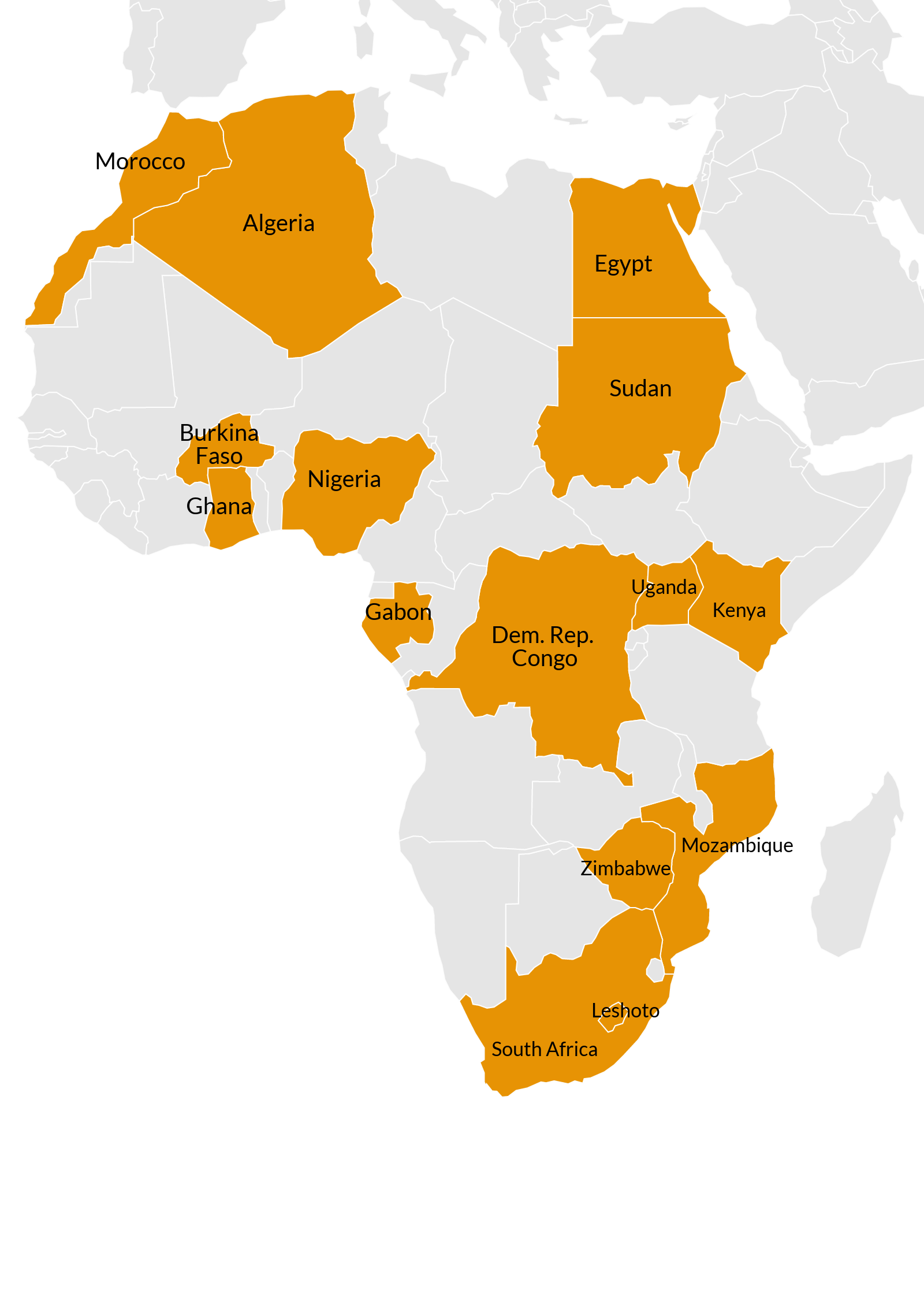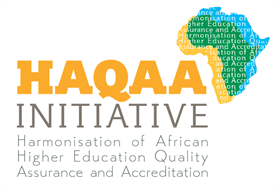Read this in: French
What is the AQRM?
Adopted by the Conference of Ministers of Education of the African Union (COMDAF) in 2007, the AQRM is a quality assessment tool for higher education institutions in Africa and one means of supporting continuous quality improvement. The self-evaluation/self-rating survey that comprises the AQRM consists of Institutional-level reference points (Governance and Management, Infrastructure, Finance, Teaching and Learning, Research, Publication and Innovation and Community Engagement) and Programme-level reference points (Programme Planning and Management, Curriculum Development, Teaching and Learning, Assessment and Programme Results). Institutions are asked to rate that themselves against standards defined under each reference point, on a scale of 1-4. In total there are 49 Institutional level standards and 35 programme level standards. It should be noted that the AQRM is not a ranking instrument for comparing institutions and is not used to create league tables.
The AQRM has been developed with the oversight of the African Union Commission (AUC) and in cooperation with higher education stakeholders and experts. The AUC supported a pilot self-rating exercise in 2010 in which 32 African institutions participated. Based on the experience and feedback gained from the pilot survey, a revised version of the AQRM questionnaire and rating instrument was developed and is now available in English, French and Portuguese.
As the AQRM should ideally be complemented with a validation visit; In 2014, a pilot cohort of nine universities participated in the self-rating exercise and received validation visits of expert teams. In 2017, the HAQAA Initiative facilitated the selection of an additional 15 universities to conduct the AQRM self-rating survey and receive verification visits by teams of African and European experts.
The AQRM in the context of HAQAA
In the interest of supporting internal quality assurance, the HAQAA Initiative has sponsored 15 African universities to evaluate themselves with the AQRM and to subsequently receive validation visits. This was intended to help the institutions build their internal QA systems and to identify areas for improvement. It was also a means to further test and apply the AQRM as a tool for quality enhancement in the African continent.
Map of countrys that participated in the AQRM Survey

In November 2016, a call was made via the Association of African Universities (AAU) for participation in this endeavour. Fifteen diverse universities from the five African regions were selected. The selection considered the motivation of the university leadership towards quality enhancement, geographic diversity, diversity of resources and missions, and linguistic diversity.
In addition, a call was made for experts, versed in institutional quality assessment, from both Africa and Europe. Fifteen different evaluation teams were composed of one European and one African expert each, as well as one African facilitator from the AAU. Some experts conducted multiple visits.
List of selected universities and evaluation teams
| S/No. | University | Country | Team of experts | Schedule of Visits |
| 1 | Ecole Normale Supérieure De Constantine (ENSC) | Algeria | Prof. Amany El Sharif, Manager of NAQAAE Training (National Authority of Quality Assurance and Accreditation of Education), Egypt | 29-30 June 2017 |
| Prof. Patricia Pol, Professeur at the Université Paris-Est Créteil, France | ||||
| Prof. Ethiene Ehile, Secretary General, AAU | ||||
| 2 | University Ouaga II | Burkina Faso | Prof. Ekisawa Constant Nkiama, Coordinateur national, Coordination nationale d’assurance qualité DR Congo | 15-16 June 2017 |
| Prof. Patricia Pol, Professeur at the Université Paris-Est Créteil, France | ||||
| Mrs Adeline Addy, Project Officer, Association of African Universities, Ghana | ||||
| 3 | Université of Kisangani | DR Congo | Prof. Mohammed Amine
Allal, Algeria |
20-21 July 2017 |
| Dr. Jochen Hellmann, Secretary General of the Franco-German University, Germany | ||||
| Dr. Violet Makuku, Project Officer, Association of African Universities, Ghana | ||||
| 4 | Al-Azhar University | Egypt | Hortense Atta Diallo, Vice-President University Nangui Abrogoua, Cote d’Ivoire | 16-17 July 2017 |
| Tatjana Volkova, Head of Licensing and Accreditation Commission, Latvia | ||||
| Dr. Violet Makuku, Project Officer, Association of African Universities, Ghana | ||||
| 5 | University of Science and Technology of Masuku (USTM) | Gabon | Prof. Ekisawa Constant Nkiama, Coordinateur national, Coordination nationale d’assurance qualité DR Congo | 19-20 June 2017 |
| Prof. Patricia Pol, Professeur at Université Paris-Est Créteil, France | ||||
| Mrs. Adeline Addy, Project Officer, Association of African Universities, Ghana | ||||
| 6 | Kwame Nkrumah University of Science and Technology | Ghana | Prof. Olugbemiro Jegede, Professor Emeritus at National Open University of Nigeria, Nigeria | 22-23 June 2017 |
| Professor Henrik Toft Jensen, Prof. Emeritus, Denmark | ||||
| Prof. Jonathan Mba, Director of Research and Academic Planning, AAU, Ghana | ||||
| 7 | The Catholic University of Eastern Africa | Kenya | Dr. Jefy Mukora, African expert from the Conselho Nacional de Avaliação da Qualidade do Ensino Superior (CNAQ), Mozambique. | 6-7 July 2017 |
| Dr. Ingederd Palmér, former rector, Mälardalen University, Sweden | ||||
| Mrs. Gabrielle Hansen, Coordinator from the Association of African Universities. | ||||
| 8 | Botho University Lesotho, Maseru | Lesotho | Prof. Olugbemiro Jegede, Professor Emeritus at National Open University of Nigeria | 26-27 June 2017 |
| Mrs. Doris Hermann, Managing Director for Strategy, Process and International – Head of Sector International, AQAS, Germany | ||||
| Prof. Jonathan Mba, Director of Research and Academic Planning, AAU, Ghana | ||||
| 9 | Université Moulay Ismail | Morocco | Prof. Amany El Sharif, Manager of NAQAAE Training (National Authority of Quality Assurance and Accreditation of Education), Egypt | 26-27 June 2017 |
| Prof. Patricia Pol, Professeur at the Université Paris-Est Créteil, France | ||||
| Prof. Ethiene Ehile, Secretary General, AAU | ||||
| 10 | Eduardo Mondlane University, Maputo | Mozambique | Mrs. Carla Queiroz, Deputy General Director, Institute for Evaluation, Accreditation and Recognition of Studies in Higher Education, Angola | 8-9 August 2017 |
| Mr. Howard Davies, Senior Adviser, European University Association, United Kingdom | ||||
| Prof. Jonathan Mba, Director of Research and Academic Planning, AAU, Ghana | ||||
| 11 | Crawford University, Igbesa | Nigeria | Dr. Beatrice Achieng’ Odera-Kwach, Senior Assistant Commission Secretrary, Commission for University Education, Kenya | 20-21 June 2017 |
| Prof. Andy Gibbs, QA Expert, United Kingdom | ||||
| Ms. Nodumo Dhlamini, Director ICT Service and Knowledge Management, AAU, Ghana | ||||
| 12 | Durban University of Technology | South Africa | Prof. Goolam Mohamedbhai, Former Vice-Chancellor, University of Mauritius. | 19-20 June 2017 |
| Dr. Margret Flieder, European Expert, Protestant University of Applied Sciences Darmstadt, Germany | ||||
| Dr Violet Makuku, Project Officer, Association of African Universities, Ghana | ||||
| 13 | Sudan University of Science and Technology, Khartoum | Sudan | Dr. Jefy Mukora, African expert from the Conselho Nacional de Avaliação da Qualidade do Ensino Superior (CNAQ), Mozambique. | 2-3 July 2017 |
| Dr. Ingederd Palmér, former rector, Mälardalen University, Sweden | ||||
| Mrs. Gabrielle Hansen, Coordinator from the Association of African Universities | ||||
| 14 | Ndejje University, Kampala | Uganda | Dr. Beatrice Achieng’ Odera-Kwach, Senior Assistant Commission Secretrary, Commission for University Education, Kenya | 15-16 June 2017 |
| Prof. Andy Gibbs, QA Expert, United Kingdom | ||||
| Ms. Nodumo Dhlamini, Director ICT Service and Knowledge Management, AAU, Ghana | ||||
| 15 | Zimbabwe Open University | Zimbabwe | Prof. Goolam Mohamedbhai, Former Vice-Chancellor, University of Mauritius. | 22-23 June 2017 |
| Dr. Margret Flieder, European Expert, Protestant University of Applied Sciences Darmstadt, Germany | ||||
| Dr. Violet Makuku, Project Officer, Association of African Universities, Ghana |
In order to prepare both the institutions and the selected experts, a preparatory workshop was held on 28-29 March in Accra, Ghana. The event was an occasion to present the general continental framework for quality assurance harmonisation (which was provided by the African Union Commission) and introduce the AQRM to the institutions and experts. Training sessions were held on how to conduct an institutional self-assessment and practices were shared from both Europe and Africa. Experts who had participated in a prior round of evaluation visits for the AQRM also shared their experiences and provided suggestions both for the expert teams and the institutions. It was reiterated that the AQRM aims at self-improvement and enhancement and was not a tool to rank or compare African universities.
Between March and June 2017, the fifteen institutions collected data and evidence internally and prepared their self-ratings according to the AQRM survey. This included selecting one study programme that would also be rated, in addition to the overall institutional ratings. Their self-assessment reports were submitted to the respective expert team in advance, which conducted validation visits between June and September. The visits entailed discussions with university leadership, programme directors, deans, professors, students and local partners. They also entailed visiting the universities’ facilities. The expert teams subsequently delivered their validation reports, which are featured in this publication.
Resources
Currently, the AQRM survey is publicly available for any interested institutions on the website of the Association of African Universities, the implementing body of the African Union Commission for higher education (link).
AQRM evaluations conducted under the HAQAA Initiative
AQRM Consolodated evaluation report
The difference between the AQRM and the ASG-QA


